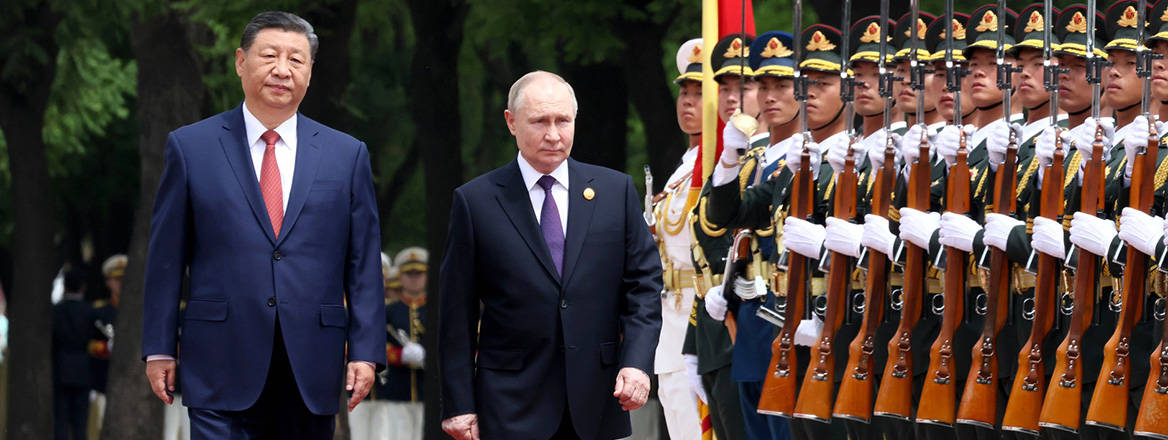Russia and China: The True Nature of their Cooperation
Strategic cooperation between Moscow and Beijing has visibly intensified in the wake of Russia’s invasion of Ukraine. However, Russia is now firmly the weaker partner in the relationship, with China exploiting the Kremlin’s situation for its own ends.
On 29 May, US Deputy Secretary of State Kurt Campbell spoke to NATO representatives in Brussels on the seriousness of Chinese-Russian relations. His words underscore the true nature of the ‘no-limits’ arrangement between Beijing and Moscow. It is not a partnership of convenience, but a concerted effort to shift the geopolitical centre of gravity towards Asia. While the West often talks about ‘bleeding Russia dry’ through the conflict in Ukraine, Campbell warns that it risks suffering a similar drawn-out death. China does not represent a voice of reason in Russia’s ear as has been suggested by some Western leaders, but has a vested interest in destabilising the West and distracting it from Beijing’s own objectives in the Indo-Pacific.
Increasing political, economic, and social burdens stemming from the invasion of Ukraine have kneecapped Russian agency in the international arena. As the divide between Russia and the West grows, the Kremlin is increasingly focusing its attention on China, with ties between the two states growing ever stronger. In defiance of the West, Russia characterises its relationship with China as an alliance between two great civilisations. However, as Russian President Vladimir Putin’s recent visit to China has highlighted, Moscow is increasingly finding itself a pawn of China’s geopolitical aspirations.
Amid increasing geopolitical turbulence, the concept of multipolarity is becoming acknowledged as a global trend. Russia and China have been quick to label themselves as key players in this emerging world order, and have collectively strived towards the formation of a bloc that is set to rival Western hegemony. At a glance, the relationship appears natural: two rising authoritarian powers are joining forces to challenge the prevailing order. Yet upon delving deeper into the relationship’s dynamics, Russia’s commitment to its war on Ukraine, its stagnating economy, and its search for support extraneous to the West have led to its foreign policy objectives becoming slowly subsumed into China’s vision of the future international order.
The New World Order
Geopolitical constraints provide Russia and China with a plethora of reasons to band together. Their distrust of Western hegemony, authoritarian governments, and similar political ambitions have nurtured relations between Moscow and Beijing for the last political generation.
In their recent press conference, both states agreed that civilisational differences shape spheres of influence; that international institutions are polarised against their interests, requiring shifts in structure to accommodate ‘new realities’; and that there is no place for military alliances in the Asia-Pacific region. Noticeably, the conversation focused on the developing trade partnership between the two states, with comments on external affairs remaining limited in detail. In comparison to Putin’s usual damning rhetoric on the collective West, the restraint within this meeting is a sign of the true dynamics of the situation – namely, that they are shaped primarily by Chinese interests.
Cooperation over Competition?
Despite exorbitant bilateral proclamations of partnership, dynamics between the two states remain cautious, partly as a result of historical tensions. Putin’s reference to Russia and China remaining ‘brothers forever’ seems to skip over the Treaty of Peking (1860), the Soviet invasion of Xinjiang (1934) and nuclear posturing during the Sino-Soviet split, to name a few ‘breaks’ in their historical relationship. These memories are still fresh in the minds of much of the Chinese population, including scholars who note an incongruence between Russian and Chinese visions of a new world order. Despite the friendly veneer, distrust remains.
Russia's refocused economy means it has no ability to provide incentives for greater integration within its historical sphere of influence in the face of Chinese economic competition
With Russia’s economy concentrated on supporting the war effort in Ukraine, its exports have become focused on shipping fossil fuels and other raw materials to Eastern partners. Meanwhile, imports from China now cover a diverse field of industrial and consumer goods, providing essential resources to sustain both Russia’s economy and the conflict in Ukraine. This asymmetrical balance is forecasted to increase over the coming years as Russia struggles to survive on its war economy, and consequently, China will become an ever more important lifeline for the Russian state.
This imbalance has precipitated unusual geopolitical concessions from Russia. The Eurasian Economic Union (EAEU), Russia’s customs union – initially conceived in part to limit Chinese influence in Russia’s historical sphere of influence – contains several states operating a multi-vector foreign policy, including investment from China’s global development project, the Belt and Road Initiative (BRI). Putin’s comments at the 2023 Eurasian Economic Forum supporting the pairing of the EAEU and BRI demonstrate both a concession in terms of Russia’s dominance over Eurasia and an acceptance of the nature of relations with China.
Development and investment have become the dominant tools for building influence in Eurasia; in this context, Russia’s economic integration with former Soviet states offers only limited influence over its neighbours. Its refocused economy means it has no ability to provide incentives for greater integration within its historical sphere of influence in the face of Chinese economic competition.
Therefore, Russia finds itself increasingly reliant on a partner with historical grievances as well as ambitions in its own backyard. If Russia continues to stagnate, it must either make further concessions regarding its geopolitical position within Eurasia, or risk severing its life support mechanism.
Russia’s Excessive Optimism
Putin’s recent visit to China, the first since his fifth inauguration as president, highlighted Russia’s strategic dependence upon its neighbour. In the opening address by the two countries’ leaders, one could see an incongruence in the rhetoric surrounding the state of Sino-Russian relations. Putin’s reference to collaboration reaching unprecedented levels was met with lukewarm compliments from Chinese President Xi Jinping about the level of cooperation, indicating a desire for improvement.
These comments exemplify Russia and China’s positions. Ultimately, Russia needs China far more than China needs Russia. The relationship hardly extends beyond the transactional, with strict limitations on bilateral cooperation on projects that do not favour Chinese interests. During Putin’s visit, aspirations for a second gas pipeline linking the two states were dashed by yet another unenthusiastic response from Beijing. While Russia still has use for China, there are clear limits to how far China will cooperate with the Kremlin’s interests.
The Ukrainian Question
Victory in Ukraine has become integral to the continuation of Putin’s reign, and consequently, the progress of the Russian invasion now dictates every facet of Russian domestic and foreign policy. This opens the door to external exploitation. China, along with other Asian states, have profited from cheap Russian oil; Central Asian states have transformed into crucial transport hubs for goods to and from Russia; and the supply of goods now underproduced within Russia’s war economy is driving increased exports from the East. The longer Russia’s attention is focused on Ukraine, the longer Russia’s neighbours will profit from its increased reliance on them.
China will happily tolerate a conflict in Ukraine, even going as far to prop up Russia’s military economy, but this does not denote an equal partnership or a friendship
Therefore, while China continues to seek a ‘political solution’ to the conflict in Ukraine, it seems more than happy to put up with a protracted conflict. China has typically remained neutral on external matters, but Russia’s invasion of Ukraine has presented Beijing with a narrow path through which it can prioritise its interests without suffering secondary sanctions from the West. On the surface, Beijing is fostering a growing trade relationship with Russia in a very particular manner, through the export of components with both civilian and military applications such as machine tools, satellite equipment, and drone technology – enough to turn a nice profit and maintain the status quo in the conflict, without overtly support Russia.
However, Campbell’s words suggest that China is providing much greater support in terms of materiel to help reconstitute Russian forces, kept out of sight to avoid Western retaliation. Ultimately, this situation seems likely, and Russia’s aggressive revanchism in Ukraine serves as an exemplary case study of the limits of Western resolve. Meanwhile, Xi’s Taiwanese ambitions loom large; with an ever narrowing window of opportunity for military action, China will likely be analysing its Russian guinea pig while propping it up just enough to continue to drain Western military and political resources.
Ultimately, China will happily tolerate a conflict in Ukraine, even going as far to prop up Russia’s military economy, but this does not denote an equal partnership or a friendship. Russia’s invasion of Ukraine suits a very particular purpose for China, distracting and draining the West. As long as this status quo continues, we can expect China to keep exploiting Russia’s position.
Conclusion
Sino-Russian relations are strengthening in the political, economic, and military domains, posing a direct threat to Western security interests. The long-term dynamics of this relationship suggest a purely transactional approach, with China exploiting Russia’s economic weaknesses. However, the war in Ukraine also presents an opportunity for China to bleed Western resolve, drain NATO resources, and distract attention from Beijing’s interests in the Indo-Pacific. Ultimately, Putin, through his dreams of Russian revanchism, has transformed Russia into a tool for its ambitious and unreliable Eastern neighbour.
The views expressed in this Commentary are the author’s, and do not represent those of RUSI or any other institution.
Have an idea for a Commentary you’d like to write for us? Send a short pitch to commentaries@rusi.org and we’ll get back to you if it fits into our research interests. Full guidelines for contributors can be found here.
WRITTEN BY
Callum Fraser
Research Analyst, International Security
International Security
- Jim McLeanMedia Relations Manager+44 (0)7917 373 069JimMc@rusi.org


